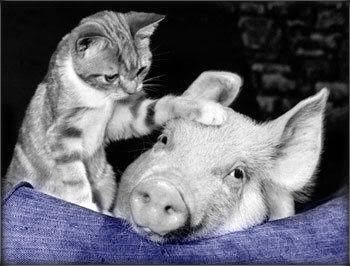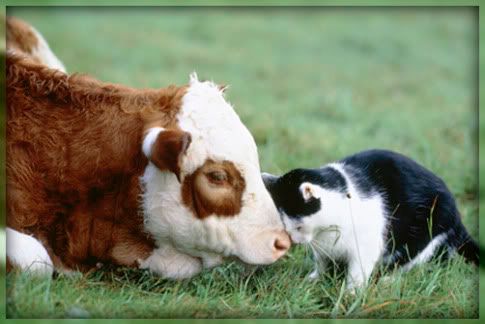Reposted with thanks to: One Voice
versus
Your Dinner
By Stephanie Ernst

It's a point made often in animal rights advocacy.
Often, the same people who
treat—and love—their dogs and cats
like members of the family,
who buy them toys and treats
and kiss them and cuddle them
and do whatever they have to do,
both practically and financially,
to make sure their dogs and cats
are happy and healthy,
also sit down to a dinner of
dead pig, cow, or chicken in the evening.
They see no discrepancy in these two behaviors:
dogs are pets and companions;
pigs are dinner.
But are pigs (and cows and chickens) truly that different from domestic cats and dogs in any way except how we think of and treat them? We recognize that our companion animals certainly do have individual personalities and experiences. They feel happiness and sadness, playfulness and fear, affection and dislike. And the same goes for the animals that humans eat.
We know that our dogs would go mad if locked, day and night for their whole miserable lives, in a barren interior space in which they could barely move, with no stimulation and no affection. We would never dream of impregnating our beloved family dog, over and over again, for the sole purpose of snatching away all her puppies the day after their birth despite the crying protests of the mother and her young, so that we could bottle her milk and consume it, after selling her puppies to be slaughtered, sautéed, and served by a neighborhood restaurant. We would never let someone neuter our dog or cat by simply cutting at him with a pair of scissors while he thrashes and cries out in pain; we would not accept the excuse that painkillers cost too much and that this is the fastest way to do it (but look how many dogs we can neuter each hour—and how cheaply—when we do it this way!). Never could we find any excuse for hanging our terrified cats upside down by their hind legs, sending them rapidly through a machine designed to cut their throats (a machine that sometimes fails because of the speed), and then lowering them into vats of scalding water, alive and conscious or not.
And even if we were told that our beloved companions would be killed in so-called humane fashion, would that make it any better? Would we be any less horrified that someone intended to kill and eat our unique, thinking, feeling, loving dogs and cats—just because that person likes the way dogs and cats taste?
Pigs are smarter than dogs (and at least as smart as three-year-old children). Cows and calves feel the same natural mother–child bond and affection as other animals. Chickens are intelligent and social creatures with a language all their own, in which they use more than twenty distinct calls to communicate with one another.
The creators of the powerful A Life Connected video remark,
"How can it be that 95% of Americans feel it is wrong to unnecessarily hurt and kill helpless animals,
yet 95% of Americans continue to unnecessarily hurt and kill helpless animals—so they can eat them?
Why the disconnection?"
On the topic of cognitive dissonance, defined by Merriam-Webster as a "psychological conflict resulting from incongruous beliefs and attitudes held simultaneously"
William Saletan wrote the following in the Washington Post:
Where were you when Barbaro broke his leg? I was at a steakhouse, watching the race on a big screen. I saw a horse pulling up, a jockey clutching him, a woman weeping. Thus began a worldwide vigil over the fate of the great horse. Would he be euthanized? Could doctors save him? In the restaurant, people watched and wondered. Then we went back to eating our steaks.
Shrinks call this "cognitive dissonance."
You munch a strip of bacon, then pet your dog.
You wince at the sight of a crippled horse
but continue chewing your burger.
Three weeks ago, I took my kids to a sheep and wool festival. They petted lambs; I nibbled a lamb sausage.
That's the thing about humans: We're half-evolved beasts. ("Dilemma of a Carnivore")
But fortunately, we don't have to be.
Source and Author:
Change org animal rights blogs
Stephanie Ernst
Posted By: One Voice

















0 Comments:
Post a Comment